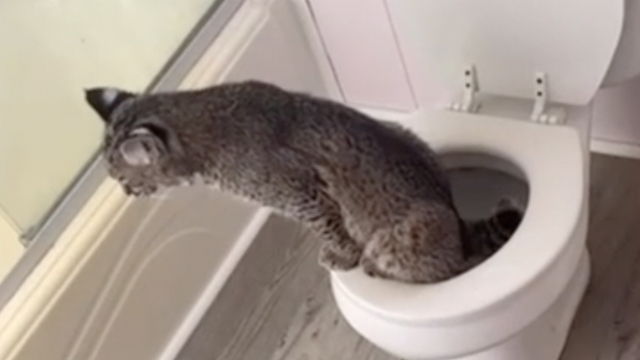Bane, a potty-trained pet bobcat who preferred his food microwaved, is in state custody and in need of a new home after Kentucky Fish and Wildlife officers seized the animal from his owner in February, according to video recordings of Grant County District Court hearings for the animal's owner.
Leyah Pilkington, Bane's owner, is charged with a misdemeanor for possessing the protected animal, a violation of Kentucky state statutes, according to her citation.
"It ripped my heart out," Pilkington said. "It was pretty rough."
Pilkington and her husband Arthur Pilkington said the bobcat was an infant when they legally bought him two years ago in Arkansas.
"I loved everything about Bane," she said. "He was a great cat."
The Pilkingtons said Bane was loving and never hurt anyone or another animal. They said he was potty-trained on their toilet and ate a nontraditional diet because he didn't like raw meat.
SEE MORE: Deputies rescue bobcat stuck inside car grill
Sometimes, he would stay in a backyard cage, but they said mostly he lived in their home where he liked to explore.
"There is no place they can't get," Arthur said. "They can jump anywhere. They can climb anywhere. You can't fault them for it. It's their nature."
Seven weeks ago, someone complained to the Kentucky Department of Fish and Wildlife Resources that the couple had a pet bobcat, according to the citation filed against Leyah Pilkington.
According to state statute, it's illegal to possess a bobcat unless they're at zoos, wildlife rehab centers or sanctuaries with state-approved permits.
Officers took Bane into custody and issued the citation to Leyah on Feb. 27, according to the citation.
Arthur said he provided the cage Fish and Wildlife officers used to remove Bane because their cage had openings that were large enough for the bobcat to get through.
Fish and Wildlife declined to comment on an active case.
Bane is one of more than 50 illegal pets seized by Kentucky Fish and Wildlife officers since Jan. 1, 2021, according to the department's chief communications officer, Kevin Kelly.
"The majority of the 57 citations were tied to deer, raccoons and alligators," Kelly wrote in an email. "Other species included red and silver foxes, primates, opossums, squirrels, mallard ducks, skunks and mink."
SEE MORE: Ohio official used town funds to buy a wildebeest for his roadside zoo
On March 28, at Leyah Pilkington's first hearing in Grant County District Court, the couple learned that Bane might be euthanized if he couldn't be placed in an appropriate permanent home.
"He's a great animal," Arthur Pilkington said. "He doesn't deserve to be destroyed."
Grant County District Court Judge Elizabeth Chandler agreed, according to video recordings of hearings in the case.
"I'm trying to save the cat," Chandler told the prosecutor and the Pilkingtons during a hearing on April 11.
She encouraged the couple to help find Bane a new home so that the state won't put him down.
Leyah's next hearing is scheduled for May 9.
"While court cases are pending, we end up having to provide care for animals," State of Kentucky Wildlife Veterinarian Dr. Christine Casey said. "We need to make sure that's humane, that they're getting their needs met."
Casey didn't comment on Bane's care or the state's investigation because it's an active case.
However, she said even if they have good intentions, families who have domesticated wildlife are caring for animals that should be in their natural environment.
"Wildlife are meant to live outdoors and I think you're doing them a disservice to keep them as a pet because they're not getting the right diet, the right environment," Casey said.
Casey said the animals "suffer from mental stress. They don't live as well as they should" when kept as a pet.
And, wildlife are not "domesticated," even if raised in captivity, according to Casey. They may become "habituated to people" but remain wild animals.
Leyah Pilkington said one of their daughters lives in Florida and has applied for a state permit that would allow her to own Bane as a pet. But she said the permit isn't expected to be approved for another four to six weeks.
This article was written by Craig Cheatham for Scripps News Cincinnati.
Trending stories at Scrippsnews.com



